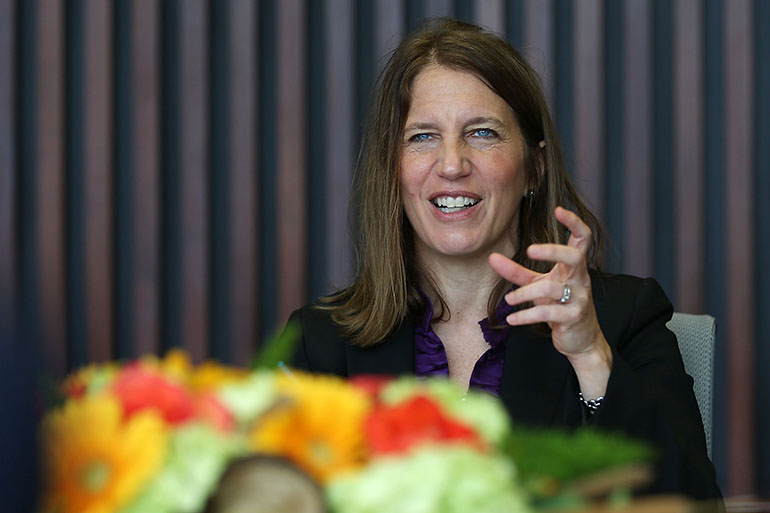Department of Health and Human Services Secretary Sylvia M. Burwell on Friday hailed the health law’s 2016 enrollment gains and said the department was already beginning to gear up for the next enrollment period.
In addition to the health law, Burwell’s agency is juggling many other priorities these days, including coordinating her agency’s response to the emerging threat of the Zika virus, President Barack Obama’s “Moonshot on Cancer” initiative and the growing epidemic of opioid abuse.
“The beat goes on,” she said during a briefing with reporters at HHS headquarters.
But she made clear that her priorities are enrolling more Americans in the 2010 health law and implementing its provisions designed to improve the quality of care while lowering its cost.
One goal is encouraging states to accept the health law’s expansion of their Medicaid programs. Burwell sees that much as a cowboy might in approaching his work: The terrain is a “very, very large ranch, ” she said. There are “a lot of places to go” as she works out details for programs and waivers that could give governors flexibility.
But there’s also a fence — the program’s statutory requirements — that give her only so much leeway.
She predicted that economic factors, such as uncompensated care and rising rates of hospital closures in states that have not implemented the law’s Medicaid expansion, will eventually bring all states on board. Nineteen states, mostly in the South, have refused to expand Medicaid, citing concerns about costs and effectiveness.
Burwell acknowledged that affordability is an issue as consumers’ costs have risen — but so has the quality, she said.
“Where there are still increases in premiums … we have seen lower premium increases for a better product,” Burwell said.
While deductibles have increased in the health plans sold on the state and federal online marketplaces where consumers can purchase coverage, they have also been increasing in employer-based plans, she said.
In addition, the law offers safeguards such as a ban against excluding people with a preexisting medical condition from coverage and limitations on out-of-pocket health spending for individuals and families, she noted.
Other legal provisions, such as no caps on annual or lifetime limits and allowing adult children up to age 26 to stay on their parent’s health coverage, are “baked in” to the health system, Burwell said. Nonetheless, Republican presidential candidates have promised to repeal the law if elected and the Republican-led Congress voted to repeal the law as well. Obama vetoed that bill.
On Thursday Burwell announced that about 12.7 million Americans enrolled in private health insurance through the federal and state marketplaces for 2016. Sign-ups for the health law’s third enrollment period — and the last that will be completed while Obama is in office — easily topped last year’s and also beat the administration’s modest forecast.
Of the 12.7 million consumers enrolling in marketplace coverage, more than 9.6 million came through the federal healthcare.gov exchange that operates in 37 states. The rest, 3.1 million, selected a plan through the 13 state-based marketplaces.
About 4 million enrollees on healthcare.gov this year enrolled in the coverage for the first time, according to HHS.
Burwell said that her team will work to keep those gains as the next enrollment season begins. She added that ACA outreach efforts around the country, such as those done at retail establishments like CVS drug stores, will help increase enrollment.
“We’ve made a lot of progress [but] we know we have more to do,” Burwell said.







